by T. Sabaratnam, April 7, 2004
Volume 1, Chapter 35
Original index of series
Unguarded Remark

J.R. Jayawardene
David Selbourne was a British journalist who worked for the Manchester Guardian freelanced for many other journals. He had been at Oxford University with Lalith Athulathmudali. He visited Sri Lanka in June 1982 and was introduced to President Jayewardene, Gamini Dissanayake and others. One day President Jayewardene invited him to accompany them in his car to a public meeting. That was one of Jayewardene’s strategies to win over journalists.
During the ride the conversation turned to the Tamil problem and its solutions. Selbourne in his report quoted Athulathmudali as saying:
We are going to break heads.
Athulathmudali naturally denied that remark and thereafter treated Selbourne as an enemy. When Selbourne returned to Sri Lanka in June 1983, detectives followed him. Selbourne went to Kantharmadam, the scene of the army arson that followed the killing of a soldier who was guarding a polling station during the May 18 local government election. He interviewed the affected people who said the reprisal was conducted after a senior officer who arrived on the scene gave the order.
Selbourne also interviewed Amirthalingam who told him that “LTTE’s actions were constantly protected by the Tamil community,” and that the LTTE was “at the forefront of the struggle for Tamil self-determination.”
Selbourne then made an appointment with Chief Justice Neville Samarakoon, who had fallen out with Jayewardene following a mob demonstration against Supreme Court judges B. S. C. Ratwatte, Percy Colin-Thome and J. E. A. Soza on 11 June. The noisy demonstration was the UNP’s answer to the decision the judges delivered in a case Vivienne Goonewardene filed against the Kollupitiya police complaining that her arrest the previous year was wrongful. Aware that the Chief Justice was waiting to blast the President and the government, Selbourne was arrested on the night of 25 June and deported.
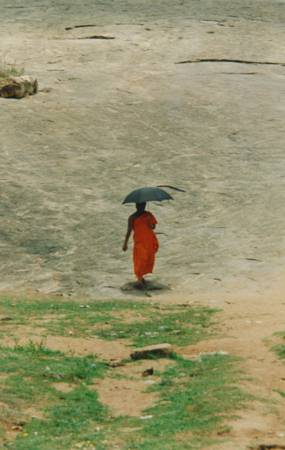
Dambulla Cave Temple
The deportation of Selbourne earned for Jayewardene and the government international rebuke. Selbourne’s article ‘Sri Lankan Army fails to stem violence’ which appeared in the Manchester Guardian of 6 July was widely copied by many papers including the Illustrated Weekly of India. In that article Selbourne commented: Even saffron-clad Buddhism with all its pieties is now armed with sub-machine guns.” The article quoted Amirthalingam as saying that the TULF would launch a satyagraha campaign in October.
Amirthalingam was not convinced. He told Wilson: “Tell the President to implement all the matters that were agreed at the earlier meetings before convening a fresh round of meetings.” He then sent the President a 2-page letter listing seven matters that were agreed but not implemented. He also listed eight other matters he wanted discussed. Jayewardene used Amirthalingam’s letter of 6 July about the situation in Trincomalee to blunt the global criticism generated by Selbourne’s extradition. He telephoned Jayaratnam Wilson who was in Canada and talked about the comment Amirthalingam had made about communal hatred permeating the armed forces. He suggested the recommencement that High Level talks between the government and the LTTE would help rebuild communal harmony. “Tell your friend I am willing to revive the High Level Committee meetings. I will have the meeting on July 9,” Jayewardene told Wilson.
Amirthalingam’s letter read:
“I am sorry to find that no action appears to have been taken on the following matters which were agreed upon at our earlier meetings:
1. The removal of the Buddha statue illegally placed on the archaeological department land at the Vavuniya junction.
2. Illicit settlers at Kokachankulam in the Vavuniya electorate planted by the Tobacco Corporation.
3. No prosecutions had been entered up-to-date against the police officers whom the DIG’s inquiry revealed as being responsible for the killing and arson in Jaffna on the 31st of May and the 1st, 2nd and 3rd of June. We were informed that plaints had been submitted to the Attorney General for approval but up-to-date no action had been taken.
4. Finalization of the scheme for the setting up of Home Guards under the District Development Councils.
5. Transferring of Tamil and Muslim police officers to the Northern and Eastern Provinces. While the situation in the Jaffna district has improved by the transferring of certain number of police officers the situation in the other districts of the Northern and Eastern provinces appear to have deteriorated. Some of the Tamil O.I.Cs of police stations in the Batticoloa and Ampara districts have been transferred out and replaced by Sinhala police officers. The number of Tamil police officers in these districts seems to have decreased contrary to our agreement.
6. No action has been taken to recruit more Tamil police officers or service personnel.
7. Alienation of land to Tamil refugees who were from Tissamaharama

Tissamaharama Tank
Amirthalingam also listed eight subjects he wanted discussed on the 9 July. The first category dealt with the improvement of the powers and functioning of the District Development Councils. The second category dealt with the allocation of houses and land falling under the Mahaweli Scheme, repair of school buildings and university admissions.
Theft of Exploders
Jayewardene was annoyed when he found that Amirthalingam had skillfully dodged the bait and had tied him down to discuss the very matters he wanted to evade. And the news that the LTTE had stolen five exploders from the KKS cement factory on 6 July night intensified his fury.
A group of LTTE cadres in military uniform led by Seelan went to the main entrance of the KKS cement factory at 2.30 a.m. Seelan, who was in the front seat, got down and summoned the soldiers guarding the entrance. They went up to him and saluted.
Seelan told them in Sinhala: “We have received information that the LTTE terrorists are going to steal the exploders. We have come to provide additional security. Do not allow anyone to enter the premises. If anyone comes keep them here. We will come and check them.”
Seelan and his men then drove straight to the store where the exploders had been stored. They opened it with the key they had obtained from a worker working in that store. They removed all the five exploders, locked the door and drove away, slowing down at the entrance to thank the soldiers guarding the entrance for their cooperation.
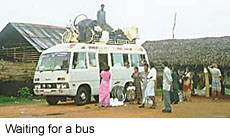
Bus transport 2002
The government reacted to this theft and the attack on the Yal Devi by TELA by restricting trains and other essential services to Jaffna. It even stopped private buses plying from Colombo. At Iratperiyakulam, near the army camp, six private buses plying to Jaffna were smashed up. A bus from Point Pedro to Colombo was fired at by the army and the driver, a Sinhalese, was injured. Defence Ministry planted stories about banning bicycle travel in Jaffna, the main mode of transport in the peninsula.
Jayewardene was riding high at this time in the South. He had engineered a split in the SLFP. He did that by enticing Anura Bandaranaike to attend the function celebrating his 40 years in politics. Vijaya Kumaratunga, an assistant secretary of the SLFP, and his wife, Chandrika, resigned from the SLFP protesting against Anura’s action. The desertion of the charismatic actor-turned politician Vijaya Kumaratunga threw the already weak SLFP into disarray. Political observes said Jayewardene had achieved what he failed to do with the Naxalite plot ploy with a simple invitation card and had established his supremacy in the south.
He could not stomach his supremacy challenged in the north and east. He gave vent to his annoyance with the TULF by canceling the High Level Committee meeting he had scheduled for 9 July and poured scorn on the Tamils through the interview he gave to Graham Ward of the Daily Telegraph on 12 July. In that interview, he gave the Tamils and the TULF a tough message: Fall in line or else…
As the preamble of that message, he said he was not worried about the opinion of the Tamil people and he wanted to wipe out the terrorists. He said:
I am not worried about the opinion of the Jaffna people now. Now I can’t think of them. Not about their lives or their opinion about us. Nothing will happen in our favour until the terrorists are wiped out. Just that. You can’t cure an appendicitis patient until you cure the appendix.
Then he hinted about silencing the TULF. He said:
They (TULF) used to speak on behalf of the terrorists. But now all that is going to cease.
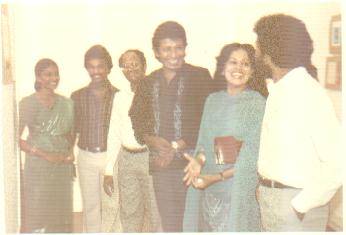
Vijaya Kumaratunge, Malini Fonseka, Lucky Dias & A.D. Ranjith Kumara
That was the first hint Jayewardene gave about the Sixth Amendment. After the cancellation of the High Level Committee meeting, he consulted the inner cabinet- Lalith and Gamini- about silencing the TULF. Lalith who was trying to get closer to Jayewardene and win his confidence suggested a constitutional ban on propagating separation.
Lalith was quite open during those days in voicing his ambition of becoming the president of Sri Lanka after Jayewardene completed his second term in 1988. But Lalith was conscious of the closeness Gamini enjoyed with Jayewardene. Lalith was also mindful of the importance Gamini enjoyed due to his control of the vast ministries of Mahaveli Development and Lands. Both were subjects close to the heart of Jayewardene. I was personally aware of Lalith’s anxieties and concerns as I covered his ministries of Trade and Shipping and Gamini’s for the Daily News. It was his desire to win the attention of Jayewardene and the people that made him to devise the Mahapola Scholarship Scheme. Noting that ‘Northern Terrorism’ had emerged as Jayewardene’s main political agenda, Lalith grabbed it. He authored the Prevention of Terrorism Act in 1979 and took upon himself the task of giving practical shape and content to Jayewardene’s wish and thinking on the Tamil problem. He also took upon himself the task of advocating and explaining Jayewardene’s views on that matter. I will give some instances of this role of Lalith as we go along.
Jayewardene, after hinting at silencing the TULF, told Graham Ward his intention to call a conference of party leaders. He said he would even invite former prime minister Sirimavo Bandaranaike and added, whether they attended the conference or not, whether they accepted his proposals or not, he would implement anti-terrorist measures.
Jayewardene dismissed Graham Ward’s question on the Report of Amnesty International with the comment that it was important to note that its key office bearers in Sri Lanka were all communists. His reference was to Desmond Fernando, secretary of the Colombo office of Amnesty International, son-in-law of Communist Party’s founder leader Dr. S. A. Wickremesinghe.
Amnesty International, in its report published on 6 July 1983, held that the government utilized the Prevention of Terrorism Act (PTA) and emergency regulations to detain and torture without trial Tamils and members of the opposition parties. It also expressed concern about random killing of selected Tamil civilians by the members of the security forces.
The report held: “Political suspects under the PTA were frequently held incommunicado, sometimes for more than eight months, that they have been tortured both in army camps and by the police. Methods of torture reportedly included hanging victims upside down from hooks, beating them with metal bars, driving needles under fingernails and applying chilly powder to sensitive parts of the body.”
It added that it had received reports about ill-treatment of detainees, denial of information about their whereabouts and prevention of meeting their lawyers.
The report made 12 recommendations which included: informing detainees of the grounds for arrest; disclosing the place of detention to relatives and allowing immediate and regular access to lawyers; establishing independent machinery to investigate complaints of torture; and restoring the normal rules of evidence, according to which statements made solely to the police while in custody and not made before the magistrate are inadmissible in court.
Amnesty International’s offer to publish the government’s comments was spurned by President Jayewardene. The government, however, issued a nine-point statement denying in general terms human rights violations, but admitted that some people had been held incommunicado. It released a comprehensive statement on the report on 22 July.
Meanwhile, the TULF General Council decided on 9 July to hold its third convention in Mannar on 23 and 24 July and V. N. Navaratnam, Member of Parliament for Chavakachcheri, announced his decision to resign his seat on 21 July. In a hard hitting statement he said his constituents elected him in 1977 for a period of six years and it was immoral to ‘cheat’ his voters. Navaratnam’s statement embarrassed the rest of the TULF parliamentarians and annoyed Jayewardene.
Jaffna District Development Council chairman S. Nadarajah’s announcement of his decision to resign his post on 15 July also caused some embarrassment to Jayewardene. Nadarajah told Jaffna newspapers that the government had failed to devolve the promised powers to the DDCs, the DDCs were not given the promised finances and they were mere shells set up to deceive the Tamils and the international community. “We are unable to answer the questions ‘boys’ are asking. My attempts to raise finances for the DDC had been over-ruled by the Finance Ministry,” Nadarajah said.
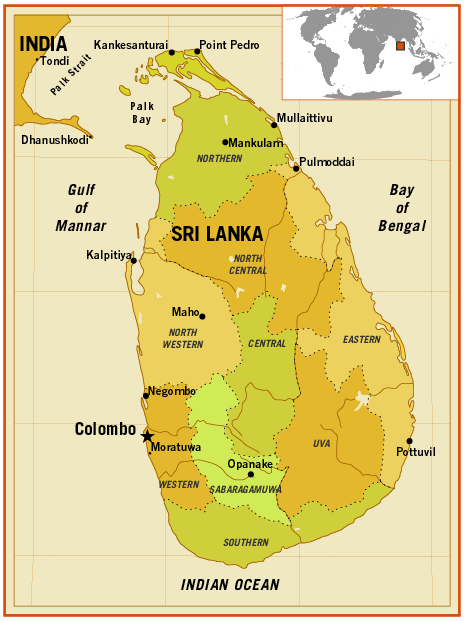
The two attempts he referred to were: the decision to charge a duty of one rupee per bag of cement manufactured at the KKS Cement Factory and the proposal to start a shipping service between Kankesanthurai and Thutukudi in Tamil Nadu. The first was over-ruled on the ground that DDCs had no power to levy duties and the second on the ground that the prevailing security situation was not conducive for a shipping service in the northern seas.The Presidential Secretariat gave the Sunday newspapers of 17 July the story about the summoning of the All-Party Conference on Terrorism on July 20. It said the conference would discuss ways and means of eliminating terrorism. It added that all main parties including the SLFP had been invited. Amirthalingam rejected the invitation saying the talks were confined to eliminating terrorism without attempting to find solutions to the problems affecting Tamils. Jayewardene immediately amended the agenda of the conference to widen its scope to include discussion on Tamil problems.
Indian Protest
The Daily Telegraph interview appeared on 18 July and Jayewardene’s brazen assertion that he was no longer concerned about the opinion of the people in Jaffna and his sole concern would be to wipe out terrorism upset Indian foreign ministry. They took up the matter with Prime Minister Indira Gandhi on 19 July who instructed Additional Foreign Secretary Shankar Bajpai to summon the Sri Lankan High Commissioner in Delhi, Bernard Tilakaratna, and convey to him India’s concern.
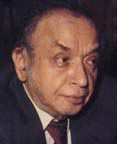
A.C.S. Hameed
India was concerned about the Emergency Regulations that gave the police and the armed forces the power to cremate or bury dead bodies without the usual post mortem examination or judicial inquest. These draconian regulations had evoked wide criticism in the Indian media, compelling Foreign Minister A. C. S. Hameed to summon Indian High Commissioner in Colombo S. J. J. Chhatwal to his ministry and explain him the reason for invoking those regulations. Chhatwal was not convinced. He sent a report denouncing the regulations.
Bajpai summoned Tilakaratna that very afternoon and conveyed him India’s concern about those regulations. He told Tilakaratna that those regulations amounted to the denial of the basic human rights and that had upset the people of Tamil Nadu. He added politely that India was only conveying to Sri Lanka a point of view about the regulations.
Tilakaratna’s reacted: My God, Mr. Bajpai! That was interference.
Then as an afterthought, he asked: Is this the view of the Tamil Nadu state government or of the centre?
Bajpai replied: It is the concern of the Indian government at the highest level.
Tilakaratna telexed Bajpai’s warning to Colombo with the comment: This statement came to me as a surprise.
Colombo was naturally angry. The Daily News was instructed to lead with the story and back it with an editorial comment. It headlined the lead story: Colombo reacts angrily to Indian meddling. Its editorial was: How come Big Brother. The Sun titled its editorial: Big Bully.
All Party Conference
The All Party Conference on Terrorism fixed for 10 a.m. on 20 July was postponed indefinitely as only the leaders of the UNP and the CWC were present. The leaders of the SLFP, TULF, LSSP, Communist Party, Tamil Congress and the NSSP were not present.
The SLFP said it did not attend the conference because the UNP did not place its proposals on the table. SLFP spokesman Lakshman Jayakody told the media that President Jayewardene was trying to play a trick on them. “He wants us to tell the conference what measures should be adopted to eliminate terrorism and then put the blame on us saying that the SLFP wanted it and he did it. Let him stop playing these tricks and tell the country straight what the UNP wants to do.” he said.
Amirthalingam gave two reasons for TULF’s decision to keep away. Firstly, Jayewardene had limited the conference to the problem of curbing terrorism without going into the question of its causes and remedies. Secondly, no solution to the Tamil problem is possible without the UNP and the SLFP agreeing on a solution.
I asked Athulathmudali: How were the tables arranged? Round or square?
Athulathmudali: The President wanted it to be arranged round because the UNP’s election manifesto of 1977 spoke about the holding of a round table conference.
I reminded him of his answer that he gave me soon after the election. I asked him then about the election promise and his reply was: What round table? We are the round table. We have the mandate from four fifths of the people. What we decide will be the solution whatever the problem, ethnic or anything else.
“I still hold to that view,” he said.
The next day, July 21, Athulathmudali not only expressed that view in parliament, but also exhorted all Sinhala- Buddhist elements to back the UNP’s effort to eliminate terrorism. In doing so, he tried to express Jayewardene’s views forcefully.
This is what Athulathmudali said:
As far as the Government is concerned, what it thinks is correct for the Tamils it will carry out. Whether you support it or not, whether you endorse it or not, we will implement what we want to implement. The government will go ahead with what it thinks is correct to bring an end to terrorism.
In the process, innocents may suffer. We will do our best to avoid it. I think the SLFP wants to fight terrorism and I am not convinced as to the reasons why they are backing out. As a Sinhalese-Buddhist party how can you refuse to participate in a conference of this nature? How will you face any election or the people if you do not come forward to eradicate terrorism? I call upon you to join hands with us to suppress these fascist terrorists.
Athulathmudali was trying to beat Gamini and get closer to Jayewardene by satisfying him. That was his politics till he was sidelined by Premadasa. He also reflected Jayewardene’s mood.
Next: Chapter 37. Heroic Death of Seelan
To be published April 14
###
Volume One
Chapter 1: Why didn’t he hit back?
Chapter 2: Going in for a Revolver
Chapter 3: The Unexpected Explosion
Chapter 4: The Tamil Mood Toughens
Chapter 5: Tamil Youths Turn Assertive
Chapter 6: Birth of Tamil New Tigers
Chapter 8: First Military Operation
Chapter 9: TNT Matures into the LTTE
Chapter 10: The Mandate Affirmed
Chapter 11: The Mandate Ratified
Chapter 12: Moderates Ignore Mandate
Chapter 13: Militants Come to the Fore
Chapter 14: The LTTE Comes into the Open
Chapter 15: The Ban, J.R.’s Gift
Chapter 16: Wresting Weapons from the Enemy
Chapter 17: Sinhala-Tamil Tension Mounts
Chapter 18: Tamils Lose Faith in Commissions
Chapter 19: Balasingam Enters the Scene
Chapter 20: Jaffna Turned Torture Chamber
Chapter 21: The Split of the LTTE
Chapter 22: The Burning of the Jaffna Library
Chapter 23: Who Gave the Order?
Chapter 24: Tamils Still Back Moderates
Chapter 25: Parliament Discuses Ways to Kill Amir
Chapter 26: The First Attack on the Army
Chapter 27: Amirthalingam Taken for a Ride
Chapter 28: RAW Meets Pirapaharan
Chapter 29: The Indian Interest
Chapter 30: LTTE Guerrillas in Action
Chapter 31: The Death of the First Hero
Chapter 32: The Return of Pirapaharan
Chapter 33: Knocking Out the Base
Chapter 34: Tamils Follow Militant Leadership